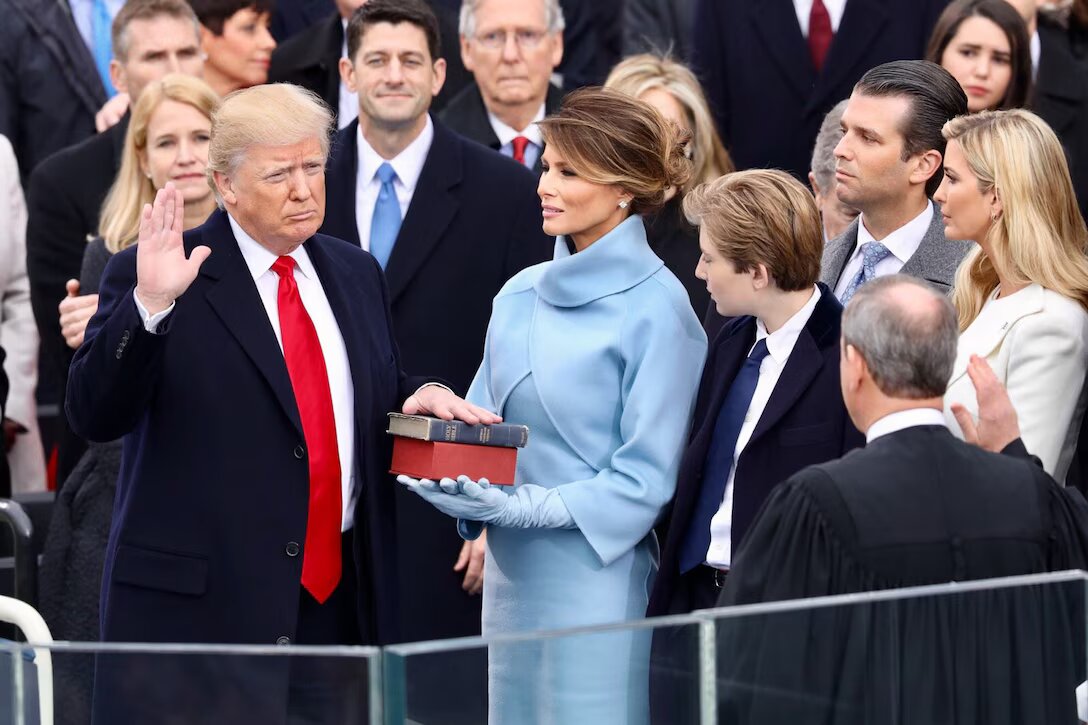Donald Trump was sworn in as the 47th president of the United States on January 20th, 2025 at the Capitol Rotunda, marking a political comeback after being convicted of felonies.
Trump overcame impeachments, criminal indictments and a pair of assassination attempts to win another term in the White House, and he planned to act swiftly after the ceremony.
Dozens of executive orders were prepared for his signature to clamp down on border crossings, increase fossil fuel development and end diversity and inclusion programs across the federal government.
The orders from the incoming Republican president will begin the process of unraveling the Democratic agenda of Joe Biden, whose term ended at noon, moments before Trump took the oath of office.
Trump’s swearing-in was moved indoors to the Capitol Rotunda — the first time that has happened in 40 years — and the inaugural parade was replaced by an event at a downtown arena. Trump supporters who descended on the city to watch the ceremony outside the Capitol from the National Mall were left to find other places to view the festivities.
At the Capitol, Vice President JD Vance was sworn in first, taking the oath read by Supreme Court Justice Brett Kavanaugh on a Bible given to him by his great-grandmother. Trump followed, using both a family Bible and the one used by President Abraham Lincoln at his 1861 inauguration. Chief Justice John Roberts administered his oath.
Trump’s inauguration realized a political comeback without precedent in American history. Four years ago, he was voted out of the White House during an economic collapse caused by the deadly COVID-19 pandemic.
Trump denied his defeat and tried to cling to power. He directed his supporters to march on the Capitol while lawmakers were certifying the election results, sparking a riot that interrupted the country’s tradition of the peaceful transfer of power.
Trump used his inaugural address to repeat his claims that he was targeted by political prosecutions, and he promised to begin “fair, equal and impartial justice.” He also acknowledged that he was taking office on Martin Luther King Jr. Day, which honors the slain civil rights hero. “We will strive together to make his dream a reality,” he said.
Now Trump is the first person convicted of a felony — for falsifying business records related to hush money payments — to serve as president. He pledged to “preserve, protect and defend” the Constitution from the same spot that was overrun by his supporters on Jan. 6, 2021. He’s said that one of his first acts in office will be to pardon many of those who participated in the riot, and he referred to them as “hostages” on Monday.
In his inaugural address, Trump vowed “the golden age of America” is starting as he listed his priorities — on trade, immigration and national security — while criticizing President Joe Biden, who sat nearby.
- First actions: Trump, who will hold an event later today at the Capital One Arena, is expected to sign a series of executive actions, including declaring a national emergency on the US-Mexico border and pulling the US out of the Paris climate deal. He is also planning to pardon nonviolentJanuary 6 defendants and commute the sentences of others.
- Preemptive pardons: Hours before the change in US leadership, Biden issued pardonsfor Gen. Mark Milley, Dr. Anthony Fauci and members of Congress who served on the committee investigating January 6. He also issued preemptive pardonsfor his brothers, his sister and their spouses.
